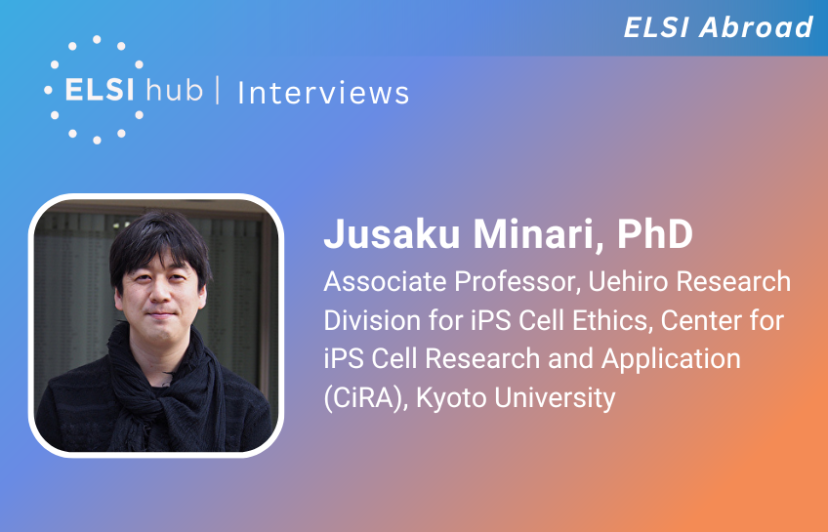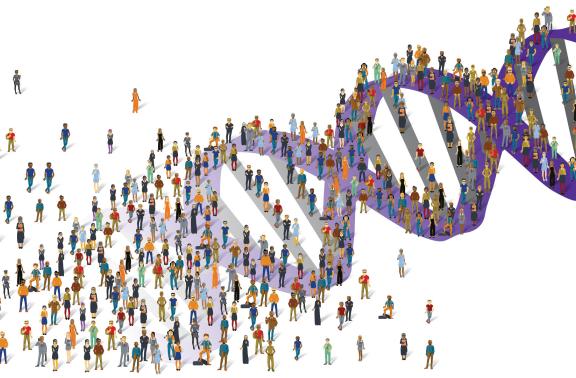
ELSI Abroad: Spotlight on Japan
For this sixth installment of ELSI Abroad, CERA spoke with Jusaku Minari, Ph.D., Associate Professor of the Uehiro Research Division for iPS Cell Ethics in the Center for iPS Cell Research and Application (CiRA) at Kyoto University. CiRA specializes in induced pluripotent stem cell (iPS) research with the goal of contributing to the development of regenerative medicine. Prof. Minari is appointed to its research division for the study of the bioethics of stem cell research, which convenes discussions, informs the public, and makes policy recommendations. Among his other research work, Prof. Minari leads the Innovation for Science, Life, and Ethics (ISLE) project which fosters creative connections between emerging biomedical technologies and society by conducting research in collaboration with artists, designers, journalists, and policy makers. Prof. Minari told us about his initial journey into ELSI research and described the ELSI research landscape in Japan.
CERA: What inspired you to focus your work on the ethical, legal, and social implications of genetics and genomics?
Prof. Minari: There were three key events in my career that inspired me to pursue ELSI research. First, in 2010, Prof. Kazuto Kato (Osaka University) made me aware of ELSI research through the Genome Science Project. Second, while participating in the 2011 ELSI Congress in North Carolina, I became convinced that ELSI is a field with very attractive research initiatives that intensely consider various aspects of the promotion of science and medicine. Finally, Prof. Jane Kaye (University of Oxford) kindly provided me with a valuable opportunity to consider the nature of the digitalization of informed consent (in particular, the possibility of online-based family consent), which is often called dynamic consent or e-consent. This occurred during my three-month stay at the Centre for Health, Law and Emerging Technologies (HeLEX), which Prof. Kaye operates. As a result, I am currently one of the academic affiliates of HeLEX.

CERA: What are you working on right now?
Prof. Minari: I am currently addressing two research initiatives. One is the exploration of ELSI in various forms of biomedical research, including genome research, stem cell research, artificial intelligence (AI), and infectious disease research. One of my recent genome ELSI studies has been conducted collaboratively with Prof. Anna Middleton and Dr. Richard Milne (Faculty of Education, University of Cambridge). Through the bottom-up perspective provided by these attempts, I am seeking to shape and form a common ground, including more fundamental ideas, concepts, and approaches, for ELSI research across different biomedical research fields while simultaneously characterizing the inherent specificity and sensitivity of the ELSI of each of these research fields in a comparable manner. The second initiative concerns the use of art and design to cultivate creative public engagement regarding biomedical research and its ELSI. I have previously created several artworks alongside various artists and designers, including paper collages, picture books, and movie clips. One example can be found on this website. More recently, using these artworks, I have established a workshop for children to help them think creatively about cells, society, nature, and space.
CERA: What can you tell us about ELSI research in Japan?
Prof. Minari: I will mention three major pieces of information that relate to this question. First, being inspired by the ELSI initiatives in the U.S., many senior genome and genome medicine researchers in Japan have strongly recognized the concept of ELSI and its significance. They have thus been supportive of the promotion of ELSI research. Nevertheless, at least two potential challenges exist: informing them about how ELSI research develops in systematic ways and how close the new findings obtained from ELSI research are to those obtained by the natural sciences. Second, several government funding agencies in Japan, including the Japan Agency for Medical Research and Development (AMED) and Japan Science and Technology Agency (JST), have previously promoted certain ELSI research programs. One example is the Responsible Innovation with Conscience and Agility (RInCA) program, which was promoted by JST. In the RInCA program, ELSI research has not only been promoted for genome research but also for many other areas of research, such as COVID-19, AI, and flying cars. This expansion of ELSI research may be an interesting trend in Japan. Finally, unlike in the case of the ELSI Research Program funded by the National Human Genome Research Institute in the U.S., these funding agencies have raised awareness about these research programs by changing their names over time. This approach may have an inherent challenge in that it could mean that the ideas, framework, and community within ELSI are unable to be fixated within various research fields over the long term.
CERA: What would you say is the most important ELSI issue in Japan right now? Why do you think this is so?
Prof. Minari: I think that the most important ELSI issue may be the increasing gap between the rapid development of genome science and medicine and public awareness and recognition of ELSI in relation to these fields. I believe that the future nature of genome research and medicine should be shaped, discussed, and confirmed with the cooperation of various people. In this regard, we have previously published two academic articles regarding the views of the Japanese public toward genome research and challenges for precision public health communication. Through these, we have recognized the necessity of education and engagement for children, young people, and the public.
CERA: What ELSI issues do you see that would benefit from multi-country deliberation by ELSI scholars?
Prof. Minari: There are many ELSI issues that would benefit. In fact, certain ELSI issues, such as the significance of human genomes, data sharing, and privacy protection, have been discussed by key international organizations, including the United Nations Educational, Scientific and Cultural Organization (UNESCO) and the World Health Organization (WHO). Nevertheless, aside from these types of initiatives, I believe that local and global ELSI research and related studies of genome research and its social applications play a key role in establishing mutual recognition and understanding across different communities, cultures, and societies. These studies cover important topics such as the definition of health and community, the nature of intellectual property and benefit sharing, the meaning of privacy protection and discrimination, and fundamental norms regarding the use of AI.
CERA: What three works of ELSI scholarship from Japan would you recommend to the global ELSI community?
Prof. Minari: I would like to suggest three academic articles, which I have significantly contributed to.
- Gaydarska, H., Takashima, K., Shahrier, S., Raz, A., & Minari, J. (2024). The interplay of ethics and genetic technologies in balancing the social valuation of the human genome in UNESCO declarations. European Journal of Human Genetics, 32(6), 725–730.
- Andrusier, O., Raz, A., & Minari, J. (2024). Cultivating awareness of donation in cutting-edge allogenic cell therapies. Cell Stem Cell, 31(7), 947–948.
- Shinomiya, N., Minari, J., Yoshizawa, G., Dando, M., & Shang, L. (2022). Reconsidering the need for gain-of-function research on enhanced potential pandemic pathogens in the post-COVID-19 era. Frontiers in Bioengineering and Biotechnology, 10.
CERA: Can you think of any online seminars, scholarly resources, or anything else that you would like us to share with the broader ELSI research community?
Prof. Minari: Unfortunately, we do not have any good examples of such things described in English. However, the movie clips I mentioned above can be viewed on this website (described in Japanese). These clips can be also viewed on Instagram, though we are still considering which kinds of English descriptions are appropriate for these artworks.
CERA: Is there anything else you would like to say?
Prof. Minari: I truly appreciate the All of Us Research Program for hosting the 2019 ELSI workshop. This workshop selected our academic article for both its “recommended reading” and “resources for participant ambassadors” sections. This article was crafted by me and two wonderful friends, Dr. Michael Morrison and Prof. Kyle B. Brothers.
I would also like to acknowledge Dr. James D. Watson, the current and previous directors and staff of the ELSI Research Program, and the global communities associated with the ELSI research. All these people have paved the way for me to develop my academic career in the field of ELSI research in Japan.
If you would like to be interviewed for a future ELSI Abroad feature, please feel welcome to email us at [email protected]. Please see our other interviews in this series focused on ELSI research in Singapore, Canada, Australia, Belgium, the UK.


